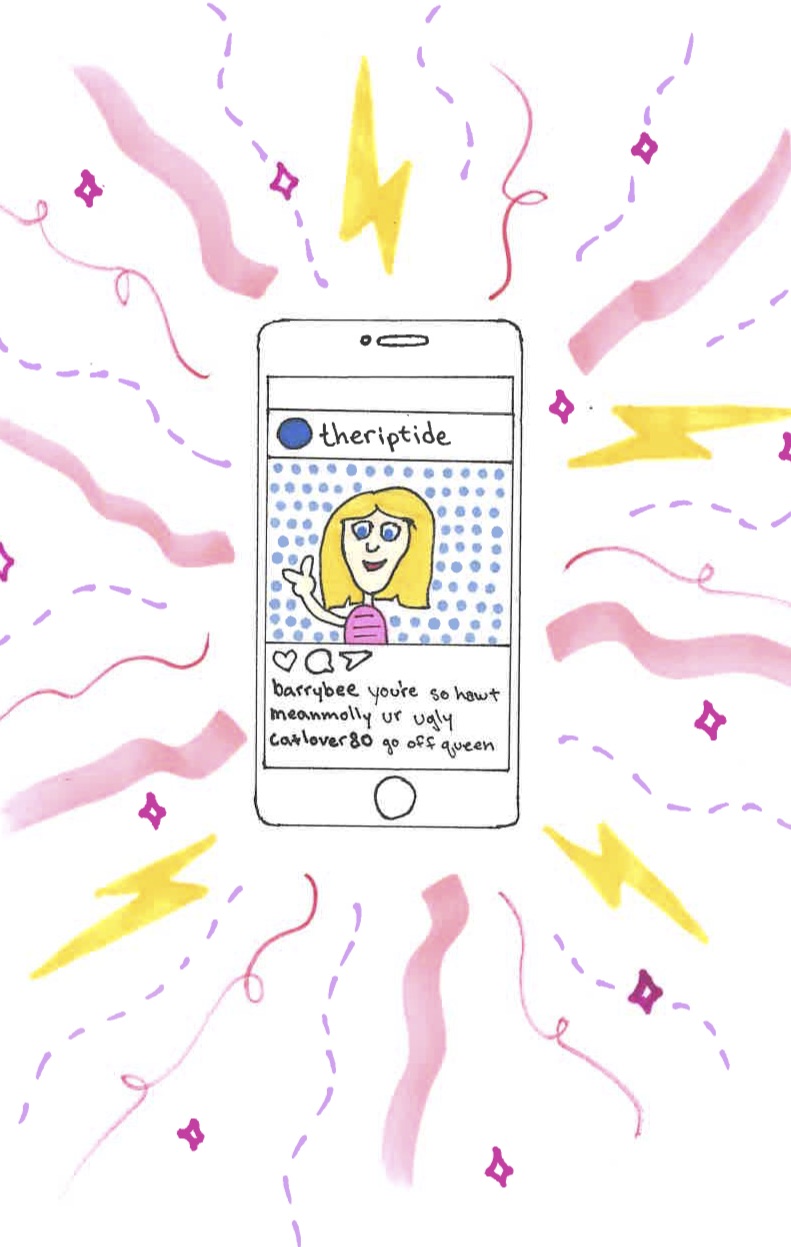Students must work towards an increased positive relationship to technologyBy Isabelle Spence, Editor-in-Chief
 The current generation has been struck by a new plague. The disease takes over their every thought, consumes all of their free time, and cripples their mental and emotional health At least, this is how some older generations have come to describe teens’ current reliance on phones and technology. A great deal of fear surrounds these relatively new machines, especially in relation to the unknown landscape of social media. While some of the fears can be proven true, it is this board’s belief that there is an equal amount of positivity as negativity that can be gained from social media. If we as a society work to develop our relationship with social media, the technology can become a tool for good.
The current generation has been struck by a new plague. The disease takes over their every thought, consumes all of their free time, and cripples their mental and emotional health At least, this is how some older generations have come to describe teens’ current reliance on phones and technology. A great deal of fear surrounds these relatively new machines, especially in relation to the unknown landscape of social media. While some of the fears can be proven true, it is this board’s belief that there is an equal amount of positivity as negativity that can be gained from social media. If we as a society work to develop our relationship with social media, the technology can become a tool for good.
Technology often acts as a divider. It alienates younger generations from their elders, who do not seem to understand the teenage consumption. A host of ailments have been blamed on social media, concerning all matters from anxiety and depression to bad skin and poor sleep. It is true that social media can play in role in these issues, but we believe it is unfair to isolate it as the only cause. This laundry list of negative effects has led to a severe lack of trust from the previous generations. However, it could be only the newness of the technology that the Baby Boomers and Gen Xers disapprove of. They did not grow up with cell phones and social media in the same way the current generation has. They don’t trust it because they don’t know it, just as their parents disapproved of new inventions at the time seemingly new age computers and television.
Teens are often profiled as being ”obsessed” or “addicted”with social media, especially platforms such as Instagram and Snapchat. These platforms are stereotyped as feeding into the supposed inherent narcissism in young people. However, there are a variety of benefits to be gained from social media. Apps like Instagram allow teens to keep in touch with their peers who may not be physically in their lives anymore, such as students who have already left for college. Apps like Snapchat encourage teens to stay in contact over long distances, and can even facilitate communication across country lines.
The issue with social media is that there is no aspect of it that is simply black and white. Many of social media’s blessings can also be it’s curses. For example, the internet allows people with similar views to find a like-minded community online. This can be incredible, such as when people who possess the minority opinions of where they live are able to find surrogate families who support their views online. Or, it can be destructive, such as when extremists are able to find people to reinforce and validate their hate. Both situations are easily possible. Social media also allows individuals to document and share their lives. Instagram, Tik Tok, Pinterest, and other photo or video sharing services encourage creativity and self-expression in their users, and can even house peoples’ livelihoods. Again, however, this can be a metaphorical wolf in sheep’s clothing. The emphasis placed on likes and views leads to an automatic comparison of profiles, which branches into a comparison of lives. People can feel inadequate, merely based off of a perfected version on a screen and are unable to truly see the full picture.
It seems foolish to curse social media for what it has done to our population. It is a technology that is here to stay, despite its criticisms, just like television and radio. Instead of disliking the platforms, it would be more productive to improve our relationship with technology.
Increasing awareness and acceptance of technology is a two-fold process. Firstly, older generations need to put aside their biases towards the platforms and examine them on their own merit. Secondly, teenagers need to listen to the advice from the adults in their lives and recognize the possibly destructive presence that social media presents. It could be a valuable experience to go on a “social media cleanse,” even for a week, to be able to observe the effects of through noticing the impacts of its absence.
In the end, social media is merely a collection of code and programming. It has no more inherent evil within it than it does inherent good. Instead, we as a society must reorient ourselves to take advantage of this incredible technology, while protecting ourselves from its negative side effects.
